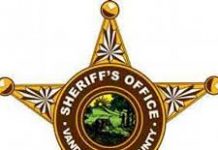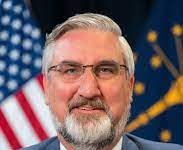November 28 – December 4The Week in Indiana History |
|||||||||||||||
“I write as the birds sing, because I must, and usually from the same source of inspiration.” Gene Stratton-Porter (1863 – 1924) Gene Stratton-Porter was an author, nature photographer, and naturalist. Her most famous novels are Freckles, and Girl of the Limberlost. Â
Did You Know?   During World War II, the United States Office of Price Administration had the authority to ration the sale of gasoline.  Each car was assigned a sticker which identified the vehicle’s fuel allotment. The most common sticker was “A.” It was issued to the general public and authorized the holder to purchase four gallons of gas per week. The “B” sticker was provided to business owners and allowed eight gallons each week. A “C” sticker was given to physicians, nurses, dentists, clergy members, and construction workers. In most cases, the “C” sticker permitted the purchase of eight gallons of gasoline per week. ANSWERS: 1. B    2. D    3. C    4. A
|
|||||||||||||||







 1885   The body of United States Vice President Thomas Hendricks lay in state in the Marion County Courthouse in Indianapolis. The funeral procession had started at the Hendricks home at Tennessee and Ohio Streets and traveled across Washington Street, where every building was draped in black. Hendricks, Vice President under Grover Cleveland, had also served as Governor of Indiana. Pictured: The statue of Hendricks on the south lawn of the Indiana Statehouse.
1885   The body of United States Vice President Thomas Hendricks lay in state in the Marion County Courthouse in Indianapolis. The funeral procession had started at the Hendricks home at Tennessee and Ohio Streets and traveled across Washington Street, where every building was draped in black. Hendricks, Vice President under Grover Cleveland, had also served as Governor of Indiana. Pictured: The statue of Hendricks on the south lawn of the Indiana Statehouse. 1923   Frank Reynolds was born in East Chicago. He attended Bishop Noll Institute in Hammond and went on to graduate from Wabash College. He was awarded a Purple Heart in World War II. Beginning a broadcasting career at WWCA Radio in Gary, he moved into television where he rose to the anchor position on ABC’s “World News Tonight.”
1923   Frank Reynolds was born in East Chicago. He attended Bishop Noll Institute in Hammond and went on to graduate from Wabash College. He was awarded a Purple Heart in World War II. Beginning a broadcasting career at WWCA Radio in Gary, he moved into television where he rose to the anchor position on ABC’s “World News Tonight.” 1942   Gas rationing went into effect across the nation. President Franklin D. Roosevelt asked Americans to conserve fuel and rubber for use in World War II. Drivers were issued stickers to place on windshields to indicate how much gasoline they were authorized to purchase.
1942   Gas rationing went into effect across the nation. President Franklin D. Roosevelt asked Americans to conserve fuel and rubber for use in World War II. Drivers were issued stickers to place on windshields to indicate how much gasoline they were authorized to purchase.




